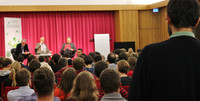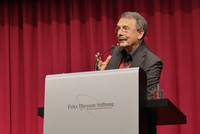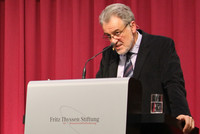Public lecture with Prof Loukas Tsoukalis (ELIAMEP) and Prof Wolfgang Streeck (MPIfG)
On 26 October 2015, Prof Loukas Tsoukalis, ELIAMEP, and Prof Wolfgang Streeck, former director of the MPIfG, held a lively discussion on the future of the Eurozone at the Fritz Thyssen Foundation in Cologne. The event was jointly organized by the THESEUS programme and EUCOPAS. The discussants clearly agreed: the situation is severe, but there are no simple solutions at reach.
"The Eurozone will not survive the next five years" – with these words Prof Wolfgang Streeck, former director of the Max Planck Institute for the Study of Societies (MPIfG) opened his speech at the Fritz Thyssen Foundation on 26 October 2015. It was the beginning of a very critical as well as metaphorical reflection on the weaknesses of the European Union’s Monetary Union and its – in his eyes – foreseeable failure. The scientist was convinced that following Greece further countries will face severe economic and financial crises; next Italy, which is "about to blow up".
Streeck’s co-speaker Prof Loukas Tsoukalis, Hellenic Foundation for European & Foreign Policy (ELIAMEP), agreed. The Greek expert shares Streeck’s worries about developments within the European Union (EU). "The mistake is that people always speak of national crises, but this is only part of the problem", said Tsoukalis. "We are facing a Eurozone crisis, a systematic crisis linked to fundamental errors in its construction." Streeck shared this opinion. Planned by the French as a mechanism to contain Germany’s power, the Union has turned out as the exact opposite: A German hegemony, argued Streeck. This hegemony was reflected not only in the way Germany dominated decisions taken in the course of the economic and financial crises, but also in handling the high numbers of refugees coming to Europe.
"Monetary Union as constructed at Maastricht was against the law of gravity", stressed Tsoukalis. "An unbalanced construction based on a weak political base, member countries with different economic structures and different political economies – it does not work." EU actors were blinded during the early honeymoon period that hid growing economic divergence inside, argued Tsoukalis. "It was a bubble that finally burst." He compared the situation of the Eurozone with an unhappy marriage: "We are unhappy with the status quo, but terrified of a divorce, which might have even higher costs than those of staying together."
Talking about solutions for the situation, even these two experts had no clear answer. "There is no obvious way out", said Tsoukalis. A return to national currencies would be extremely costly in economic and political terms. EU member states like Denmark or Sweden are doing fine with keeping their national currency, stated Streeck. Though, once having the euro it was difficult to go back. Tsoukalis spoke of a possible grand bargain to sustain the euro and European integration, but recognises that it is difficult and politically unlikely. One important step is to accept the fact that one solution does not necessarily solve the same problems in several countries, argued Streeck. "We need to start understanding other countries' way of thinking". He referred to the example of treaty-making: "Whereas Germans think the debate ends with having a treaty, the French see it as start of the discussion", he said smiling.
The debate was opened and chaired by Prof Wolfgang Wessels, Jean Monnet Chair at the University of Cologne. Dr Frank Suder, Director of the Fritz Thyssen Stiftung, and Mirja Schröder, THESEUS Project Manager, introduced the event.
The speakers:
Prof Loukas Tsoukalis is a renowned Greek professor of Political Economy at the University of Athens and the Hellenic Foundation for European & Foreign Policy (ELIAMEP). He will be teaching at Harvard University next year. His research covers a wide range of issues related mostly to European integration. In his studies, he develops strategies to deal with the current crisis within the Eurozone. In 2014, he won the THESEUS Outstanding Award of the University of Cologne.
Prof Wolfgang Streeck is one of the leading German scientists of political Economy, dealing with the interdependence of politics and economy. He is former director of the Max Planck Institute for the Study of Societies (MPIfG) and published various works on the development of capitalism and its consequences on democracy, disparities among countries of the Eurozone and effects of austerity policy in Europe.


